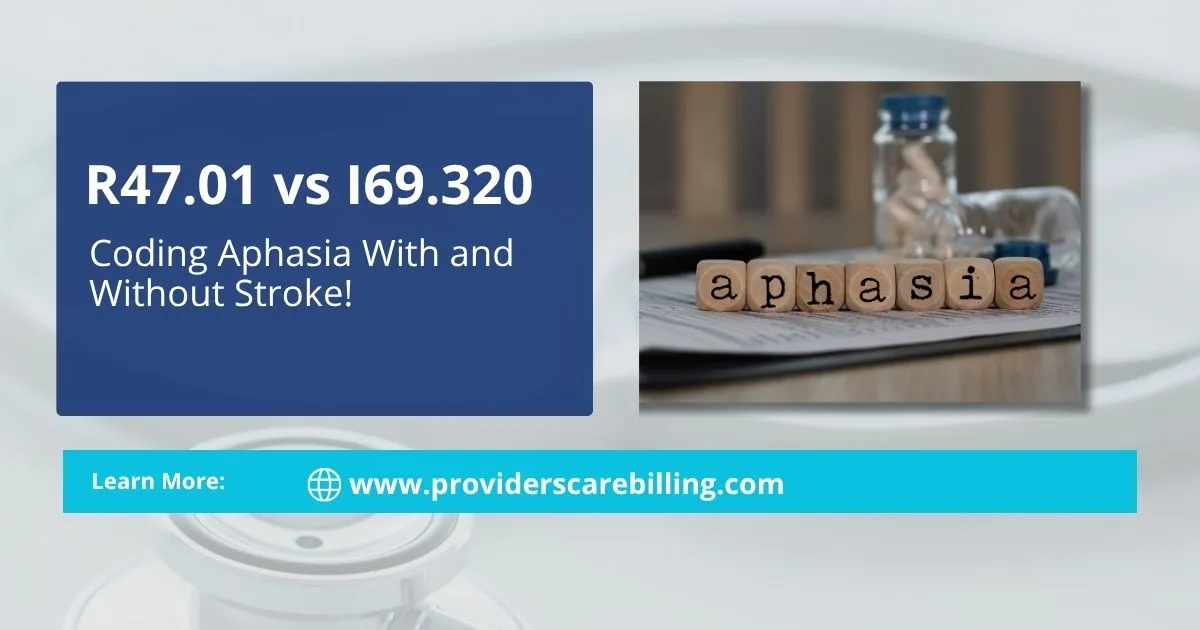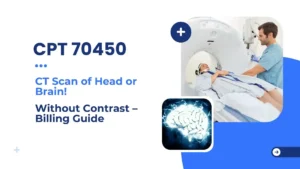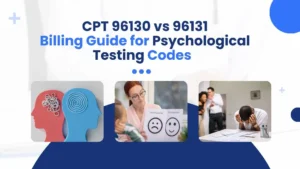Aphasia is a disorder that occurs in most people. It significantly impairs someone’s ability to communicate. It can affect humans’ articulation, reading, and writing. Sometimes, it also involves understanding spoken language. Most people who suffer from aphasia have experienced a stroke.
Other causes include head trauma, brain tumours, and certain medical conditions. This is the reason why, in medical coding and billing, selecting the correct ICD-10 code for aphasia, like other diseases, is vital.
In medical billing and coding, there are two common codes in the ICD-10-CM document for aphasia are R47.01 and I69.320. They appear to be different, but in fact, they are used in different ways. Assigning the appropriate codes aids synchronization among healthcare practitioners, insurers, and billing personnel.
This blog post will explain both codes in a simple and easy-to-understand manner. We will explain the meaning of each code, its appropriate timing of usage, and tips on accurate coding for aphasia, whether it results from a stroke or other factors.
ICD-10-CM Code for Aphasia Following Cerebral Infarction I69.320
Let’s start with I69.320. When a patient has aphasia after a stroke, this specific code is used. This also means that when a patient had a stroke that blocked the blood flow to the brain. Then they feel they have trouble speaking. So, the correct ICD-10-CM code used for Aphasia following cerebral infarction is I69.320.
This code comes under the category of sequelae. It also refers to long-term effects that happen after the main condition. The stroke is the main event, and the aphasia is the lasting effect in this case.
You might also see the following related search terms:
- Aphasia ICD 10
- Aphasia following CVA ICD 10
- CVA expressive aphasia ICD 10
- Slurred speech due to CVA, ICD 10
- I69.352 ( code is used for other speech and language after stroke)
When Should You Use I69.320?
Use this code if the provider’s documentation links the aphasia to a previous stroke. It doesn’t matter if the stroke happened recently or years ago. If the patient is still experiencing speech problems due to the stroke, this is the correct code.
Here are Some Examples:
- A patient comes in for rehab therapy after a stroke and still has difficulty speaking.
- The regular appointment shows the patient is recovering. It also indicates the patient still has some expressive aphasia.
- The doctor noted in the chart that the patient has aphasia due to a prior cerebral infarction.
In all these cases, I69.320 is the right choice.
Documentation Tips for I69.320
Documentation must show that the aphasia is caused by a stroke for this code to be valid. The best way to use these wordings is as:
- Aphasia due to prior CVA
- Speech difficulty following cerebral infarction
- Aphasia post-stroke
The ICD-10-CM Code for Aphasia is R47.01
Here, we will discuss the R47.01 code. This is the ICD-10 code for aphasia without a specific known cause. It is also used when the cause is not confirmed.
R47.01 – Aphasia
This is a symptom code, not a diagnosis that includes the cause. It’s used when a patient has aphasia, but there’s no documentation showing it is related to a stroke or any other specific event. You might see this code used in:
- Initial visits where the patient reports sudden trouble speaking, but no confirmed diagnosis has been made yet.
- General aphasia cases where the provider has not linked the symptoms to a stroke, trauma, or disease.
- Follow-up care is provided when no underlying cause is ever identified.
When Should You Use R47.01?
Use R47.01 when:
- There’s no stroke mentioned in the documentation.
- Aphasia is a standalone symptom.
- The brain tumor, traumatic brain injury, or degenerative disease are other causes of aphasia.
This code is also suitable for use during the initial evaluation phase before a complete diagnosis is made.
Documentation Tips for R47.01
Since this is a general symptom code, you don’t need to link it to a specific cause. However, you should still document:
- When the symptoms started
- How aphasia is affecting the patient
- Any notes that rule out or suggest possible causes
You can update the code to something specific, like I69.320, if tests or scans confirm a stroke.
R47.01 vs I69.320: What’s the Difference?
The simple comparison to make these codes different from one another.
| Feature | R47.01 | I69.320 |
| Code Type | Symptom code | Sequela (late effect) code |
| Cause Needed? | No | Yes – previous stroke |
| Specificity | General Aphasia | Aphasia from cerebral infarction |
| Best used when? | This cause is unknown and not linked to stroke. | Aphasia is clearly due to stroke. |
If the patient has a history of stroke, and the aphasia is due to that stroke, always use I69.320. But if there’s no confirmed cause, or the cause is not a stroke, then R47.01 is the better fit.
Understanding The Importance Of Coding Accuracy
What interprets the patient’s story and the journey of issues they are facing is encoded in R47.01 and I69.320. Medical coding is much more than a simple number; it tells a mighty tale. The importance of precise coding is shown through:
- Helps providers create the right treatment plans
- Ensures insurance companies process claims correctly
- Supports data reporting and quality measures
- And also protects against claim denials and audits
But if there are Issues with patient records, billing systems, and care delivery processes, they can arise from the use of inaccurate codes.
A Note About I69.352 and Related Codes
I69.352 speech and language disorders post stroke conversation is very common as well, but does not pertain specifically to post stroke aphasia and is coded “aphasia”.One should always verify the language disorder the patient presents, along with the relevant terminology used in the documentation by the provider.
It can range from simple ‘is it aphasia’ questions to more complex differential diagnosis. Use of I69.320 is more appropriate in cases when the diagnosis is known to be stroke-caused aphasia.
If your practice delivers integrated behavioral care, be sure to review our complete guide to CoCM billing using 99492, 99493, 99494, and G2214.
Quick Recap
- R47.01 is used for general aphasia when the cause is unknown or undocumented.
- I69.320 is used when aphasia is a result of a stroke, specifically cerebral infarction.
- Never use R47.01 if documentation connects the aphasia to a past stroke.
- Make sure your provider’s notes support whichever code you use.
- Use codes like I69.352 only when the language disorder isn’t aphasia.
Conclusions
Both R47.01 and I69.320 assist in the description of aphasia. The proper code for aphasia ICD-10 is based on the patient’s condition. It was linked either with a stroke or the true documentation. Selecting the correct code supports your team in compliance. It prevents billing inaccuracies. It ensures that patients receive the appropriate care.
Need Assistance with Coding or Billing of Aphasia?
If R47.01 or I69.320 confuses you, don’t worry. Providers Care Billing, LLC’s specialist medical billing team is ready to assist you. We provide complete coding assistance, documentation assessments, compliance consultancy, and other services to simplify your work.
Contact us today and code confidently.





